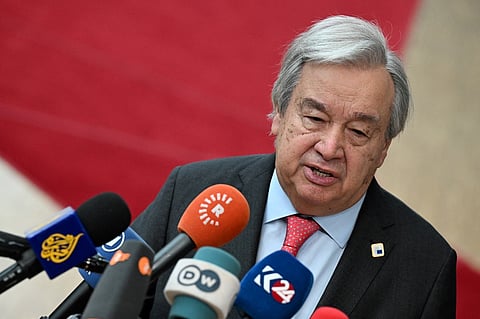

UN Secretary-General Antonio Guterres on Thursday painted a dark picture of the situation in the Middle East, warning that spiraling tensions over the war in Gaza and Iran's attack on Israel could devolve into a "full-scale regional conflict."
Guterres also said Israel's military offensive on Hamas militants in the Gaza Strip, in retaliation for their unprecedented 7 October attack on Israel, had created a "humanitarian hellscape" for civilians trapped in the besieged Palestinian territory.
"The Middle East is on a precipice. Recent days have seen a perilous escalation — in words and deeds," Guterres told a high-level Security Council meeting, with several foreign ministers present, including from Jordan and Iran.
"One miscalculation, one miscommunication, one mistake, could lead to the unthinkable — a full-scale regional conflict that would be devastating for all involved," he said, calling on all parties to exercise "maximum restraint."
Iran unleashed a barrage of missiles and drones on Israel over the weekend, after an attack on its consulate in Damascus widely blamed on Israel.
Israeli officials have not said when or where they would retaliate, but the country's military chief has vowed a response.
Guterres condemned both the consulate attack and the flurry of drones, saying that the latter constituted a "serious escalation."
"It is high time to end the bloody cycle of retaliation," he said. "It is high time to stop."
"The international community must work together to prevent any actions that could push the entire Middle East over the edge, with a devastating impact on civilians. Let me be clear: the risks are spiraling on many fronts."
For Guterres, de-escalation of the situation would begin by ending fighting in Gaza, where at least 33,970 people have been killed, according to the health ministry in the Hamas-run territory.
The militants' 7 October attack resulted in the deaths of 1,170 people in southern Israel, mostly civilians, according to official Israeli figures.
Hamas also took about 250 hostages. Israel estimates 129 of them remain in Gaza, including 34 who are presumed dead.
"I reiterate my calls for an immediate humanitarian ceasefire and the immediate release of all hostages held in Gaza," Guterres said.
"In Gaza, six and a half months of Israeli military operations have created a humanitarian hellscape," he lamented, and while he said Israel had made "limited progress" on allowing more aid into the territory, he called for more to be done.
"Our aid operations are barely functional. They cannot operate in an organized, systematic way; they can only seize opportunities to deliver aid whenever and wherever possible," he said.
"Delivering aid at scale requires Israel's full and active facilitation of humanitarian operations."
Guterres's speech came as the Security Council was poised later in the day to vote on a Palestinian bid for full UN membership — an initiative that seemed destined for failure in the face of opposition from the veto-wielding United States.
The UN secretary-general also called on Israel to put a stop to settler violence in the occupied West Bank, after the killing of a 14-year-old Israeli boy sparked Israeli attacks in dozens of Palestinian villages.
"I call on Israel, as the occupying power, to protect the Palestinian population of the occupied West Bank against attacks, violence and intimidation," he told the Security Council.
